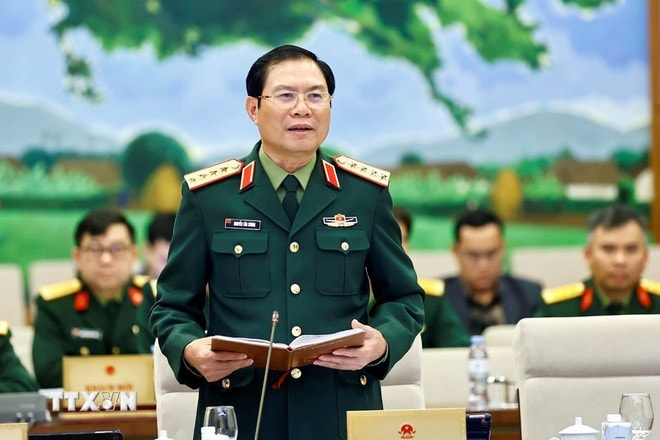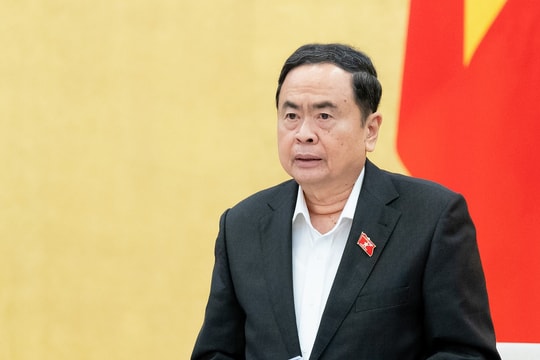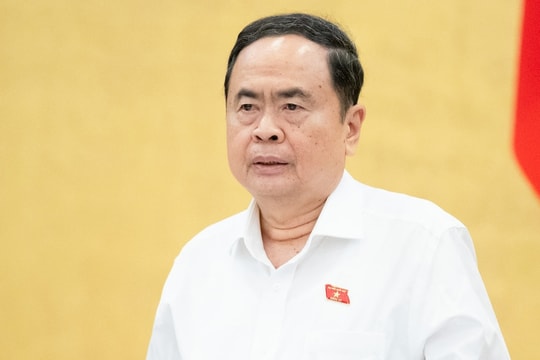Submitting to the National Assembly the draft Law on State of Emergency at the 9th Session
The Law on State of Emergency stipulates the principles, order, procedures, and authority to declare, announce, and abolish a state of emergency; measures to be applied in a state of emergency...
Continuing the 43rd Session, on the afternoon of March 14, the National Assembly Standing Committee gave opinions on the draft Law on State of Emergency.
Presenting the Report on the draft Law, General Nguyen Tan Cuong, Chief of the General Staff of the Vietnam People's Army and Deputy Minister of National Defense, said that the Law on State of Emergency stipulates the principles, order, procedures, and authority to declare, announce, and abolish a state of emergency; measures to be applied in a state of emergency; organization of implementation of the Resolution to declare and the Order to declare a state of emergency; and responsibilities of agencies, organizations, and individuals in a state of emergency.
The draft Law consists of 6 chapters and 42 articles; specifying 2 policies approved during the proposal stage of the Law project. Of which, policy 1: Measures applied in a state of emergency, authority to organize, direct, operate and decide to apply special measures of a number of subjects in a state of emergency; policy 2: Measures to support businesses; relief, support for people to respond during and after a state of emergency.
Presenting the Verification Report, Chairman of the National Assembly's Committee on National Defense, Security and Foreign Affairs Le Tan Toi stated that the Committee agreed on the necessity of promulgating the Law on State of Emergency to institutionalize the Party's guidelines and policies on perfecting the system of legal documents on disaster and incident prevention, response and recovery; ensuring compliance with the provisions of the 2013 Constitution on human rights and civil rights. The promulgation of the Law aims to promptly overcome shortcomings and limitations in the practical implementation of the law on state of emergency, especially since the outbreak of the COVID-19 pandemic.
Regarding the application of the Emergency Law and related laws (Article 4), the Standing Committee basically agrees with the necessity of this provision because the law on the state of emergency has its own characteristics. The Emergency Law is a general law, so it is necessary to simultaneously apply specialized laws to jointly regulate issues related to the state of emergency.
Regarding the measures applied in a state of emergency (Chapter III), the examining body basically agrees with the provision authorizing the Prime Minister: In case of necessity, the Prime Minister may apply measures that are not yet prescribed by current law. However, to ensure compliance with the Constitution, it is proposed to supplement the content of these measures to be consistent with the principles prescribed in Article 3, and at the same time, it is necessary to continue to clarify the effective time, subjects, and specific measures to ensure feasibility.

The draft Law stipulates that “Special patrol teams of the police, military and militia forces” have the authority to search people, vehicles, residences, objects, and temporarily detain people, vehicles, and objects that pose a threat to national security and social order and safety in a state of emergency. There are opinions suggesting that this provision should be studied, regulated in accordance with and consistent with the provisions of the Criminal Procedure Code.
Agreeing with the necessity of promulgating the Law on State of Emergency, members of the National Assembly Standing Committee said that the draft Law basically follows the Party's guiding viewpoints on innovation, perfecting the law-making process and requiring innovation in law-making thinking; it is qualified to be submitted to the National Assembly for consideration and comments at the 9th Session.
Members of the National Assembly Standing Committee proposed to continue to study and carefully review legal documents related to the state of emergency and international treaties to ensure consistency, compatibility, feasibility, and harmonious handling of relevant provisions in other laws, ensuring the consistency of the legal system.
The drafting agency studies the scope of adjustment to suit the name and content of the law, not replacing other specialized laws that are regulating the content of the state of emergency; only focusing on regulations on principles, order, procedures, authority to declare, announce and abolish the state of emergency./.



.jpg)
